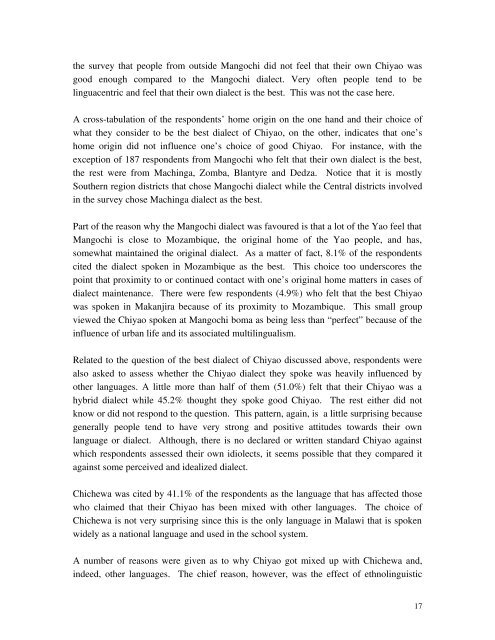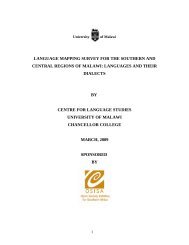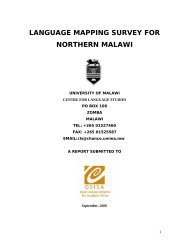SOCIOLOLINGUISTIC SURVEYS - Centre for Language Studies
SOCIOLOLINGUISTIC SURVEYS - Centre for Language Studies
SOCIOLOLINGUISTIC SURVEYS - Centre for Language Studies
Create successful ePaper yourself
Turn your PDF publications into a flip-book with our unique Google optimized e-Paper software.
the survey that people from outside Mangochi did not feel that their own Chiyao was<br />
good enough compared to the Mangochi dialect. Very often people tend to be<br />
linguacentric and feel that their own dialect is the best. This was not the case here.<br />
A crosstabulation of the respondents’ home origin on the one hand and their choice of<br />
what they consider to be the best dialect of Chiyao, on the other, indicates that one’s<br />
home origin did not influence one’s choice of good Chiyao. For instance, with the<br />
exception of 187 respondents from Mangochi who felt that their own dialect is the best,<br />
the rest were from Machinga, Zomba, Blantyre and Dedza. Notice that it is mostly<br />
Southern region districts that chose Mangochi dialect while the Central districts involved<br />
in the survey chose Machinga dialect as the best.<br />
Part of the reason why the Mangochi dialect was favoured is that a lot of the Yao feel that<br />
Mangochi is close to Mozambique, the original home of the Yao people, and has,<br />
somewhat maintained the original dialect. As a matter of fact, 8.1% of the respondents<br />
cited the dialect spoken in Mozambique as the best. This choice too underscores the<br />
point that proximity to or continued contact with one’s original home matters in cases of<br />
dialect maintenance. There were few respondents (4.9%) who felt that the best Chiyao<br />
was spoken in Makanjira because of its proximity to Mozambique. This small group<br />
viewed the Chiyao spoken at Mangochi boma as being less than “perfect” because of the<br />
influence of urban life and its associated multilingualism.<br />
Related to the question of the best dialect of Chiyao discussed above, respondents were<br />
also asked to assess whether the Chiyao dialect they spoke was heavily influenced by<br />
other languages. A little more than half of them (51.0%) felt that their Chiyao was a<br />
hybrid dialect while 45.2% thought they spoke good Chiyao. The rest either did not<br />
know or did not respond to the question. This pattern, again, is a little surprising because<br />
generally people tend to have very strong and positive attitudes towards their own<br />
language or dialect. Although, there is no declared or written standard Chiyao against<br />
which respondents assessed their own idiolects, it seems possible that they compared it<br />
against some perceived and idealized dialect.<br />
Chichewa was cited by 41.1% of the respondents as the language that has affected those<br />
who claimed that their Chiyao has been mixed with other languages. The choice of<br />
Chichewa is not very surprising since this is the only language in Malawi that is spoken<br />
widely as a national language and used in the school system.<br />
A number of reasons were given as to why Chiyao got mixed up with Chichewa and,<br />
indeed, other languages. The chief reason, however, was the effect of ethnolinguistic<br />
17





